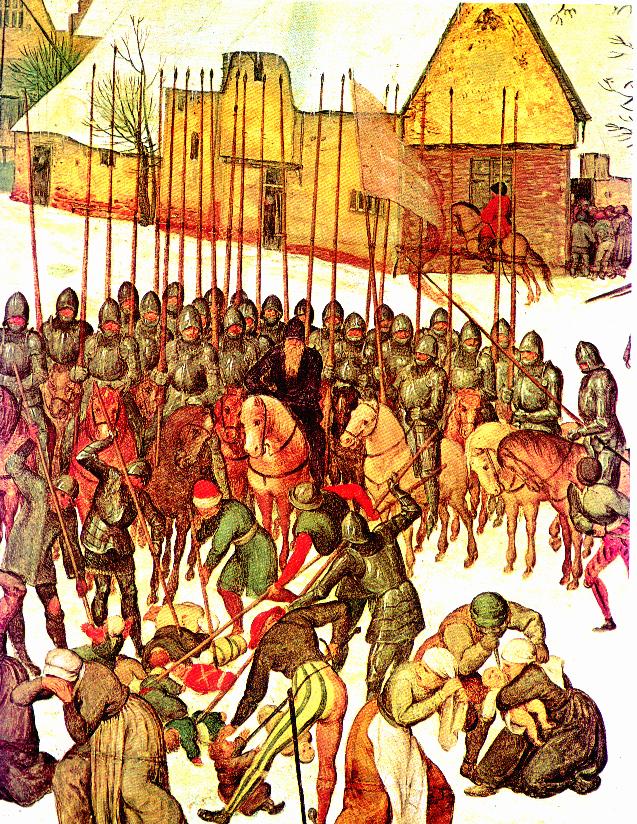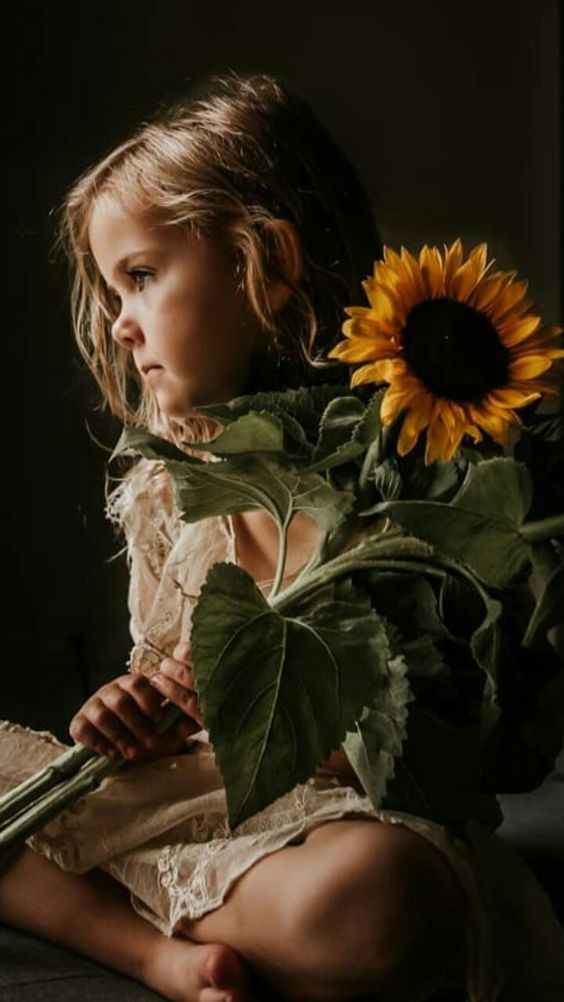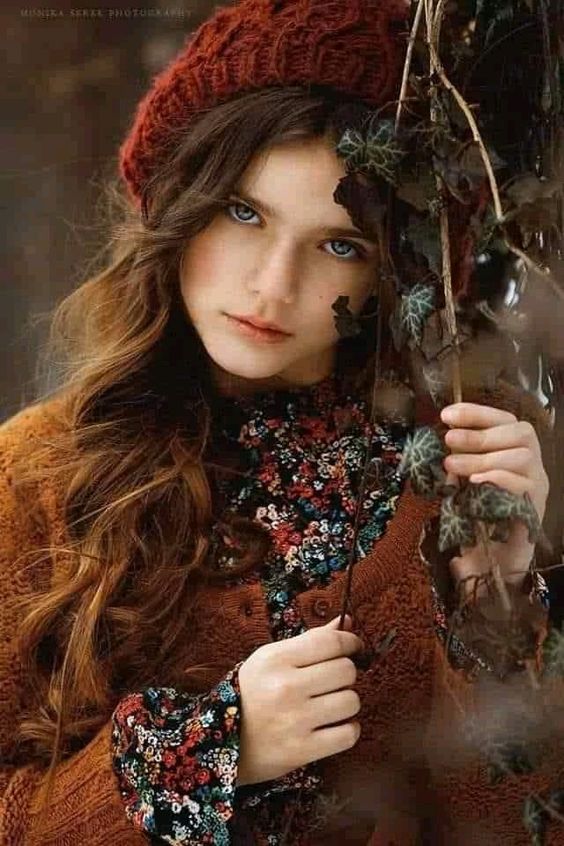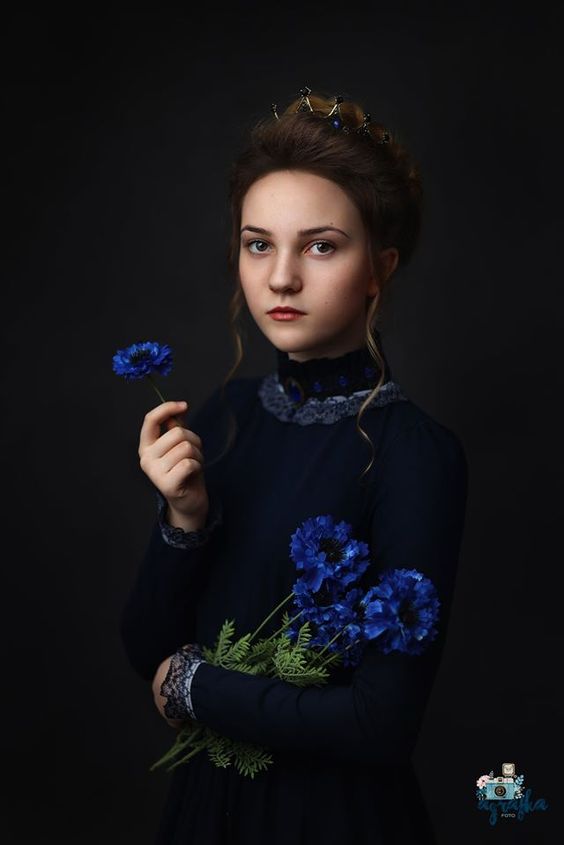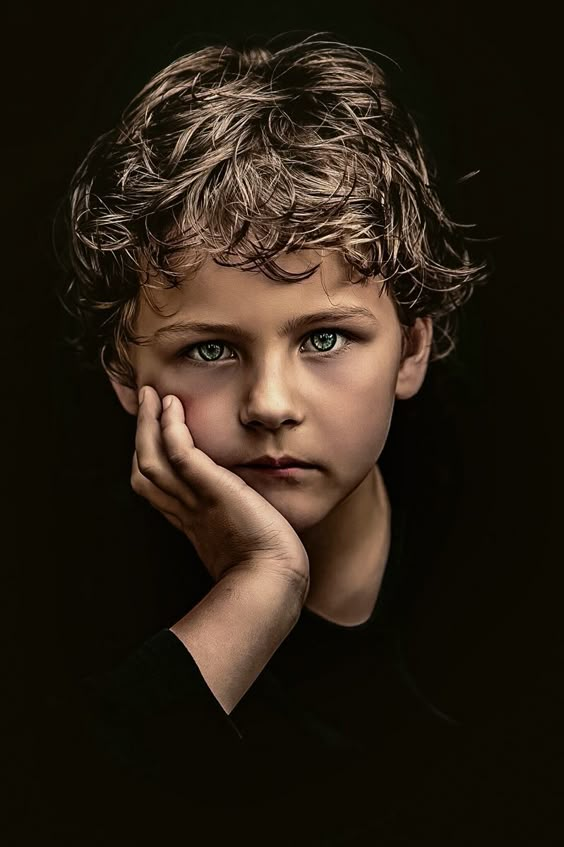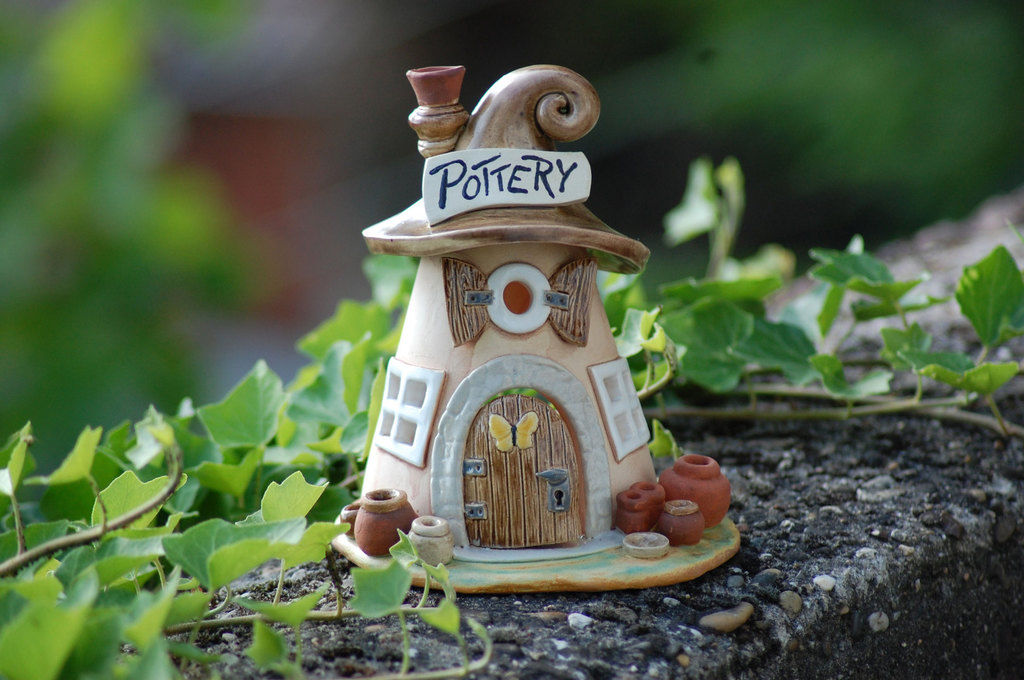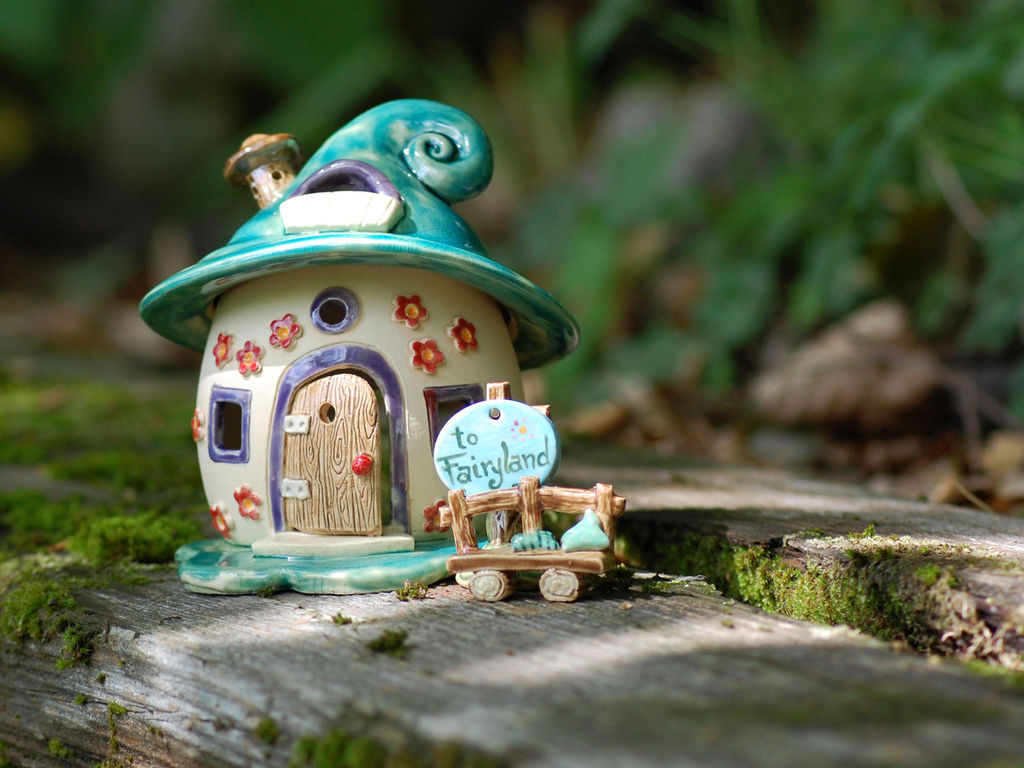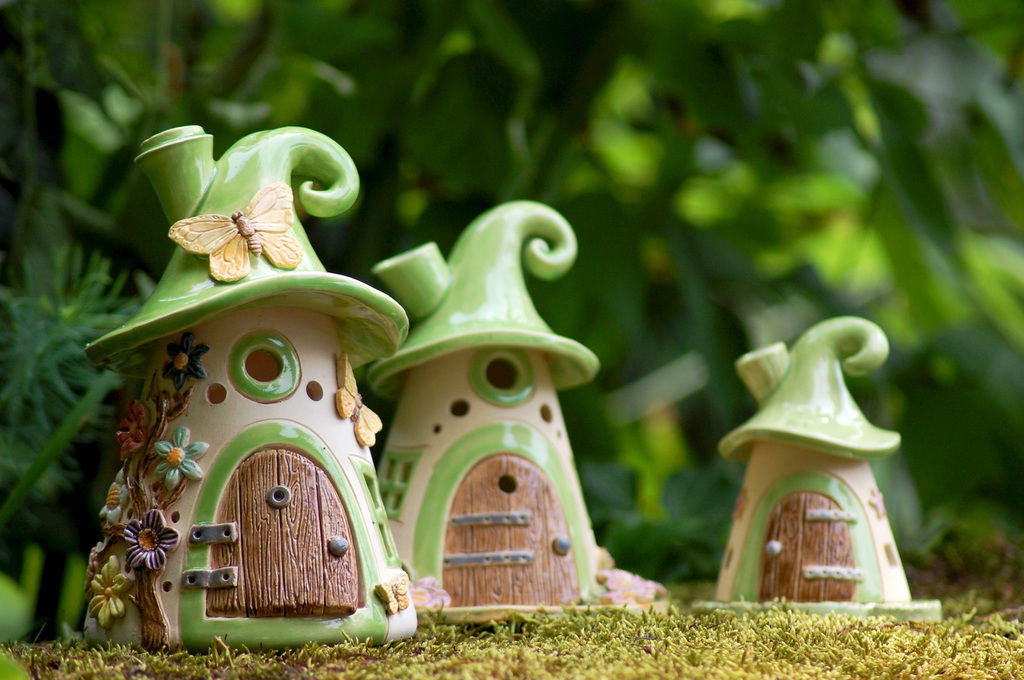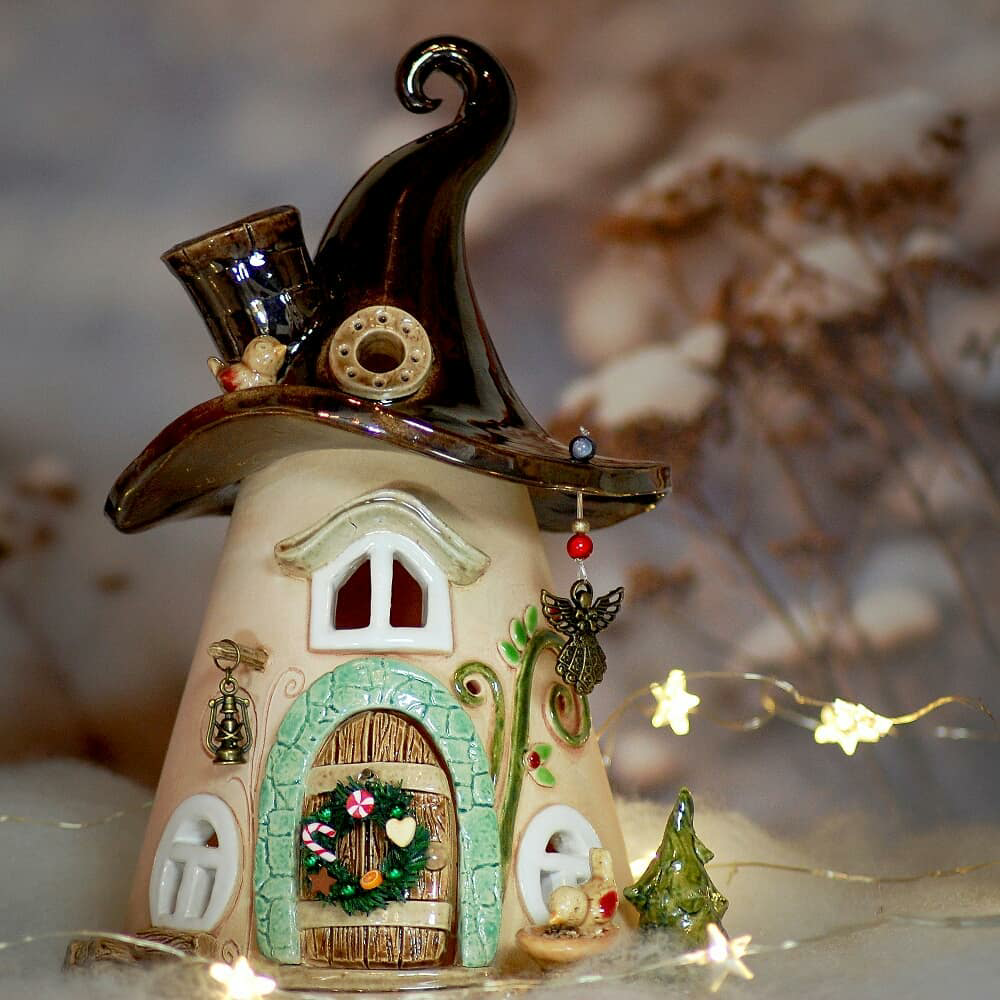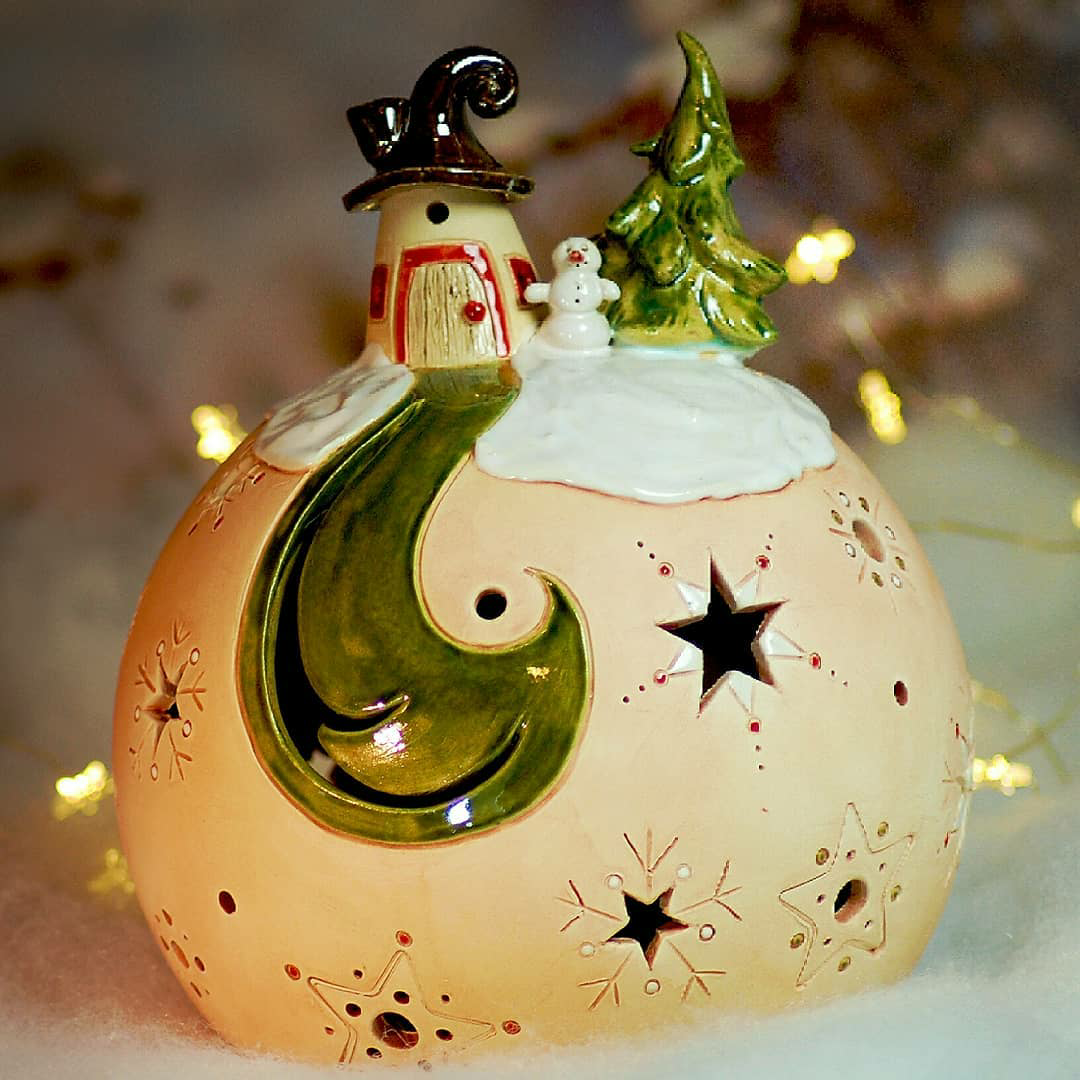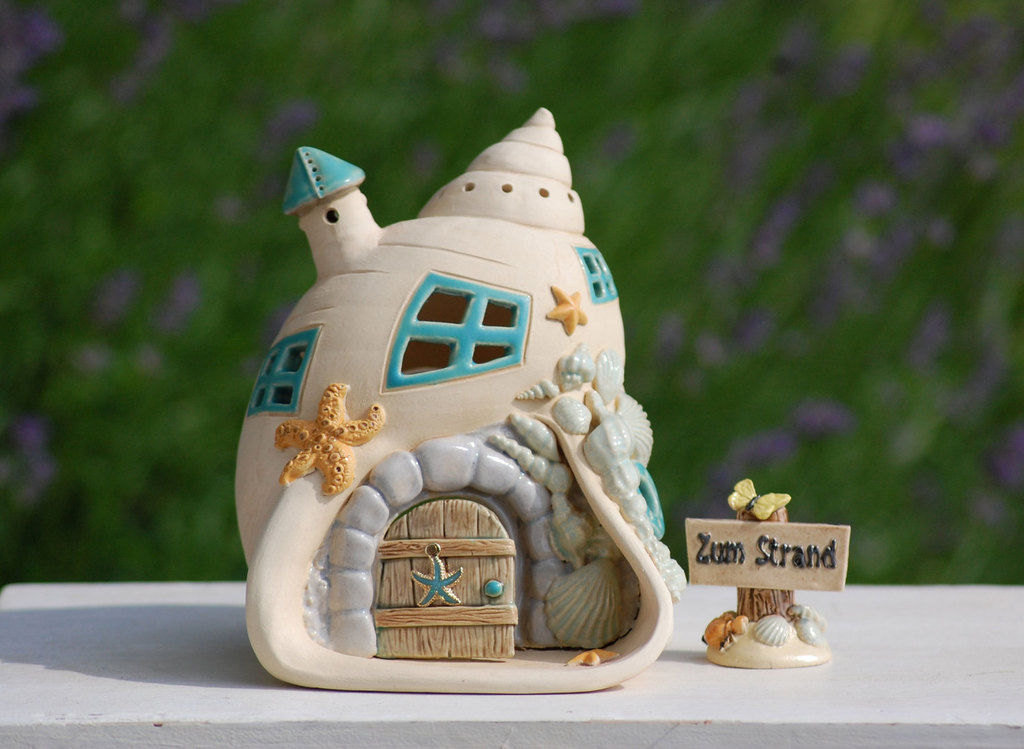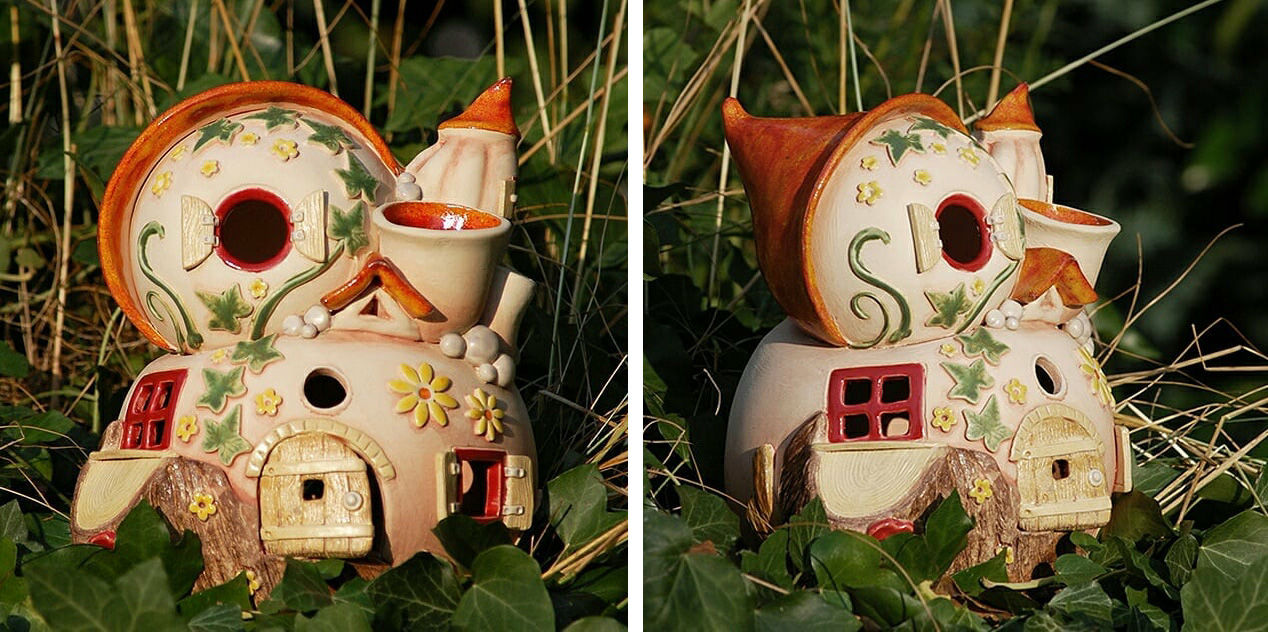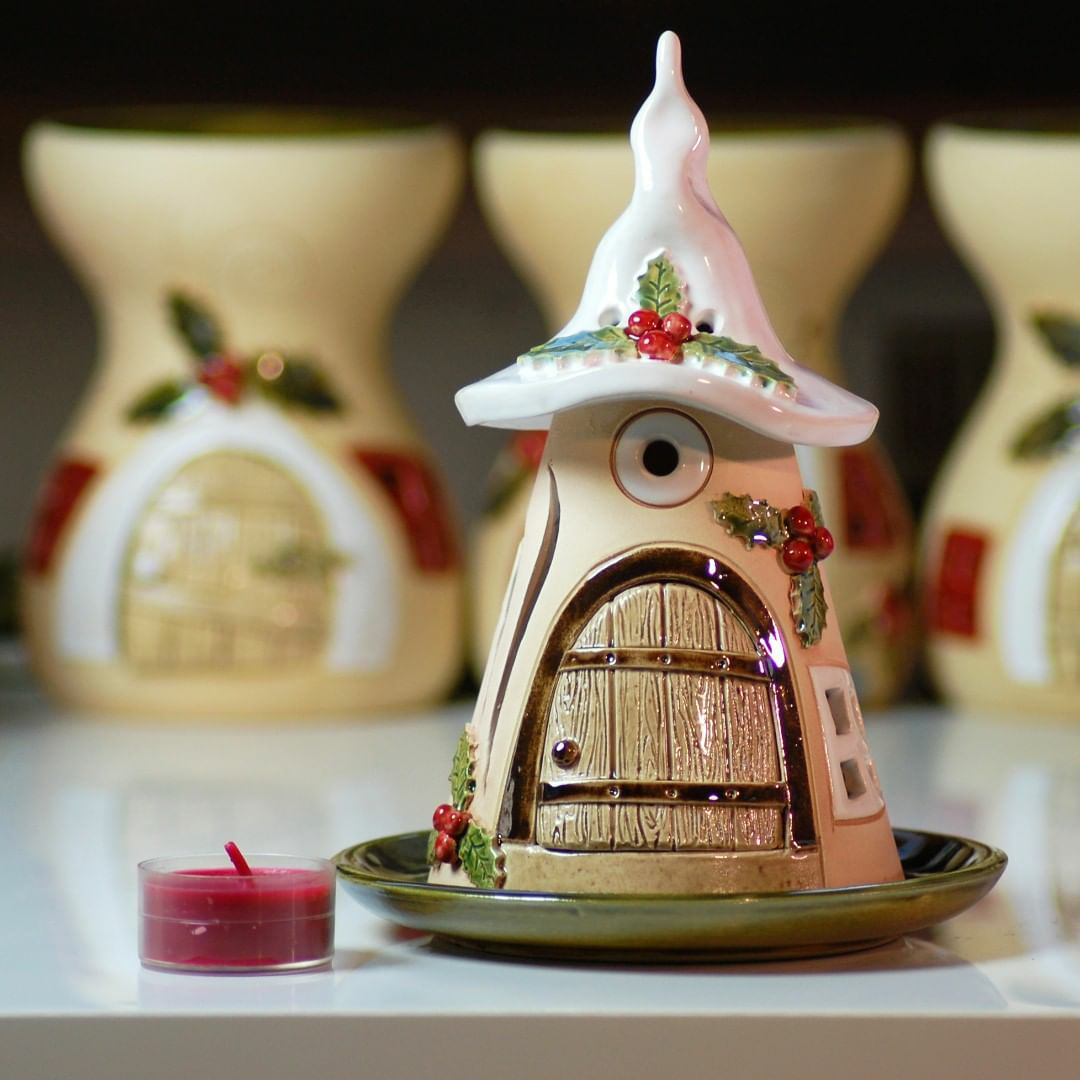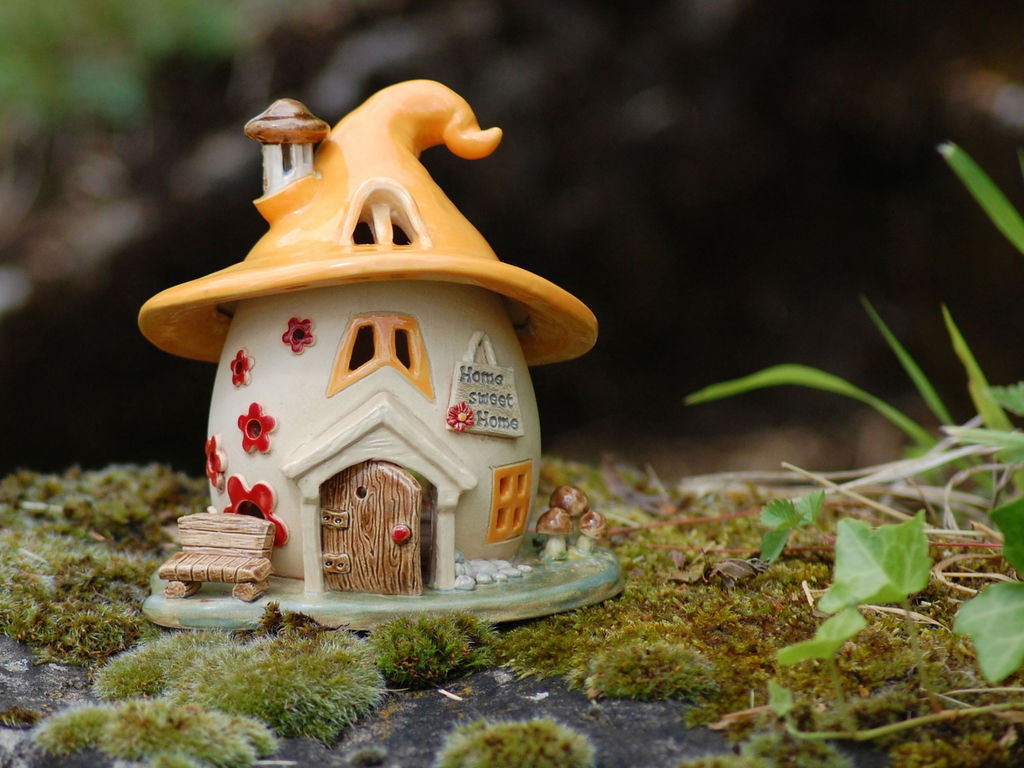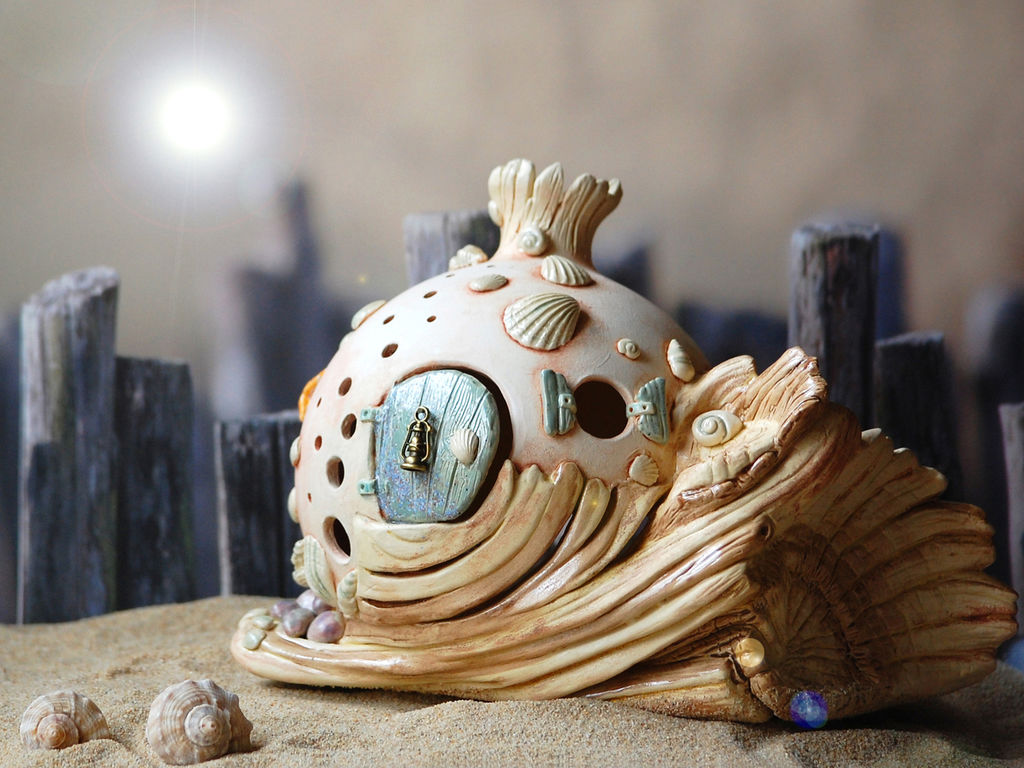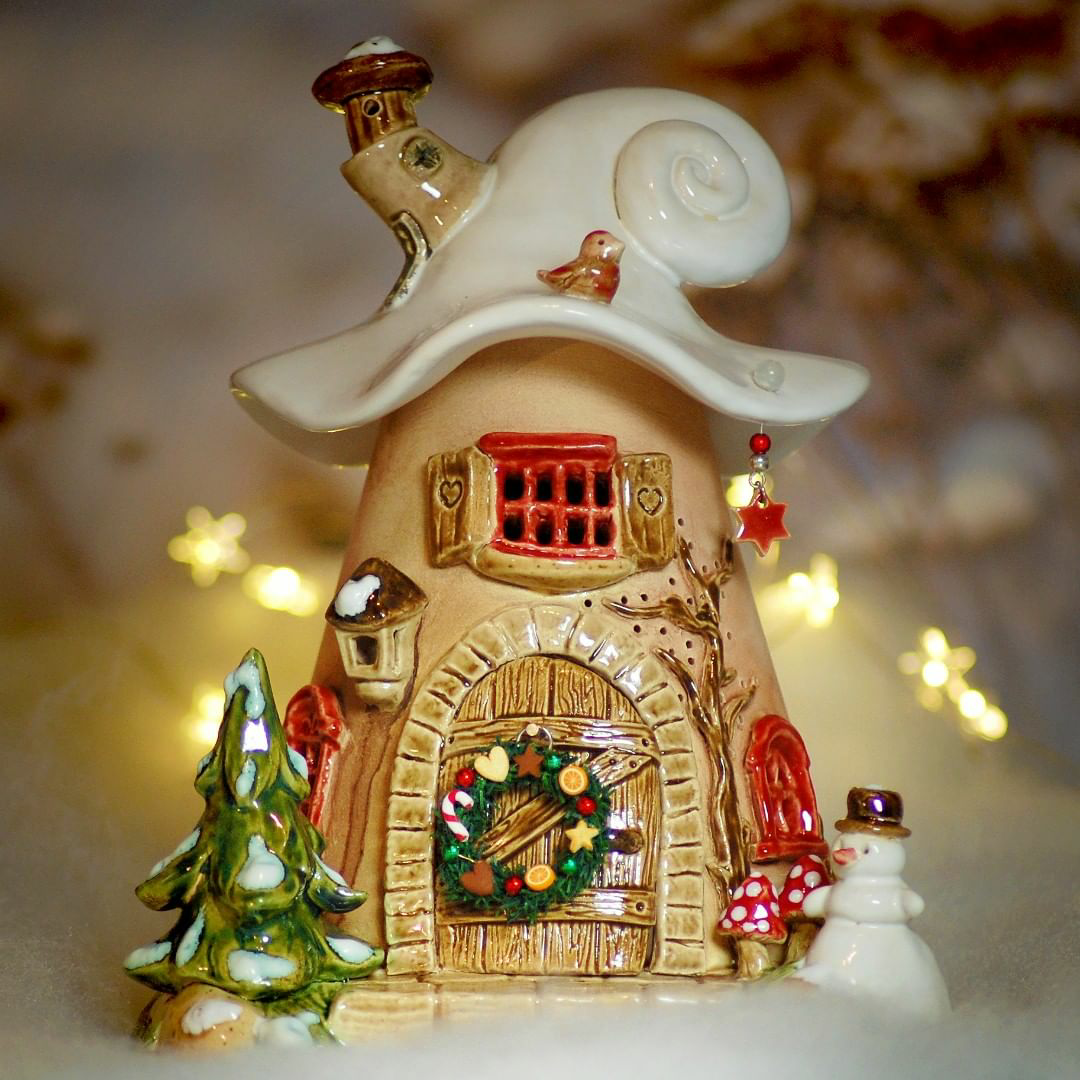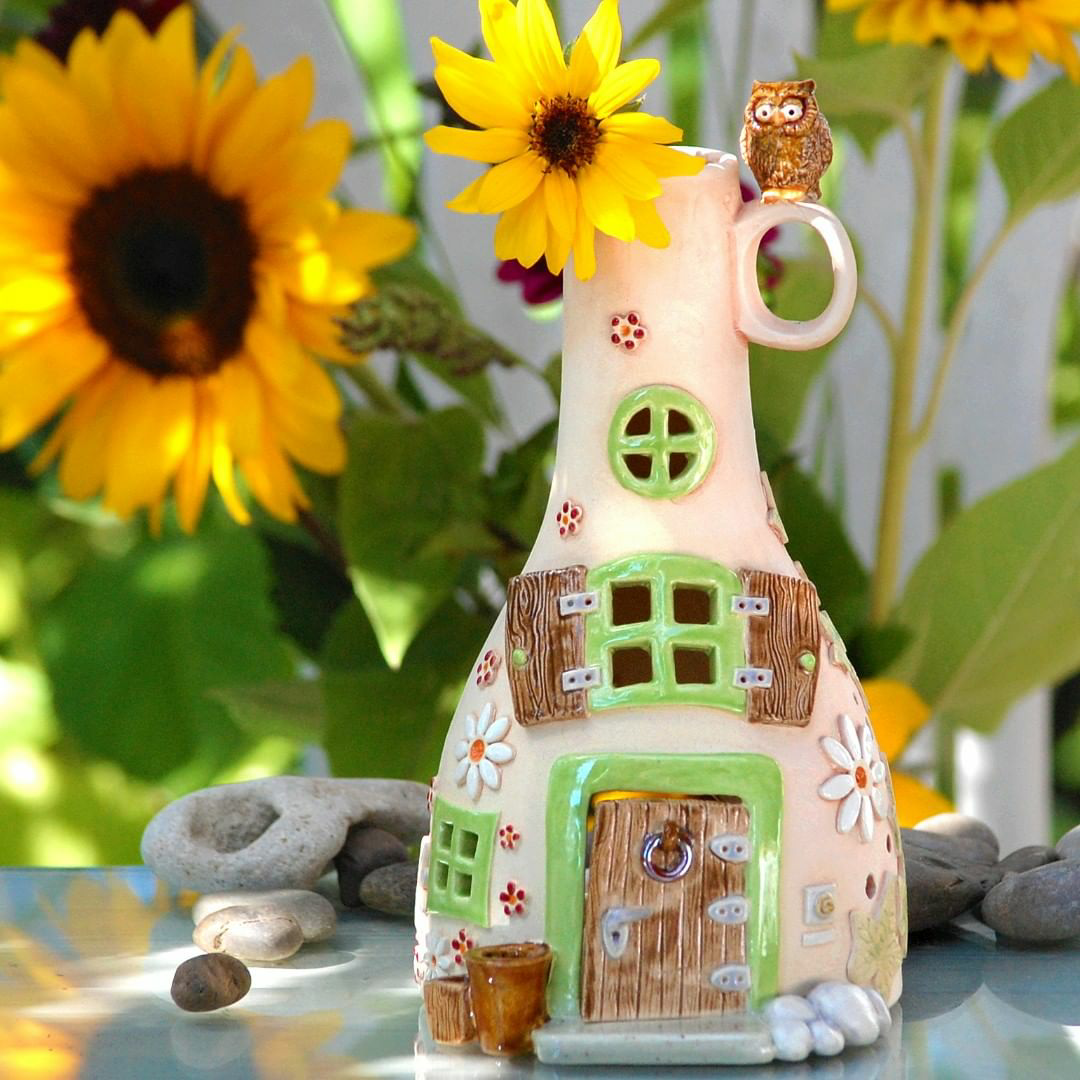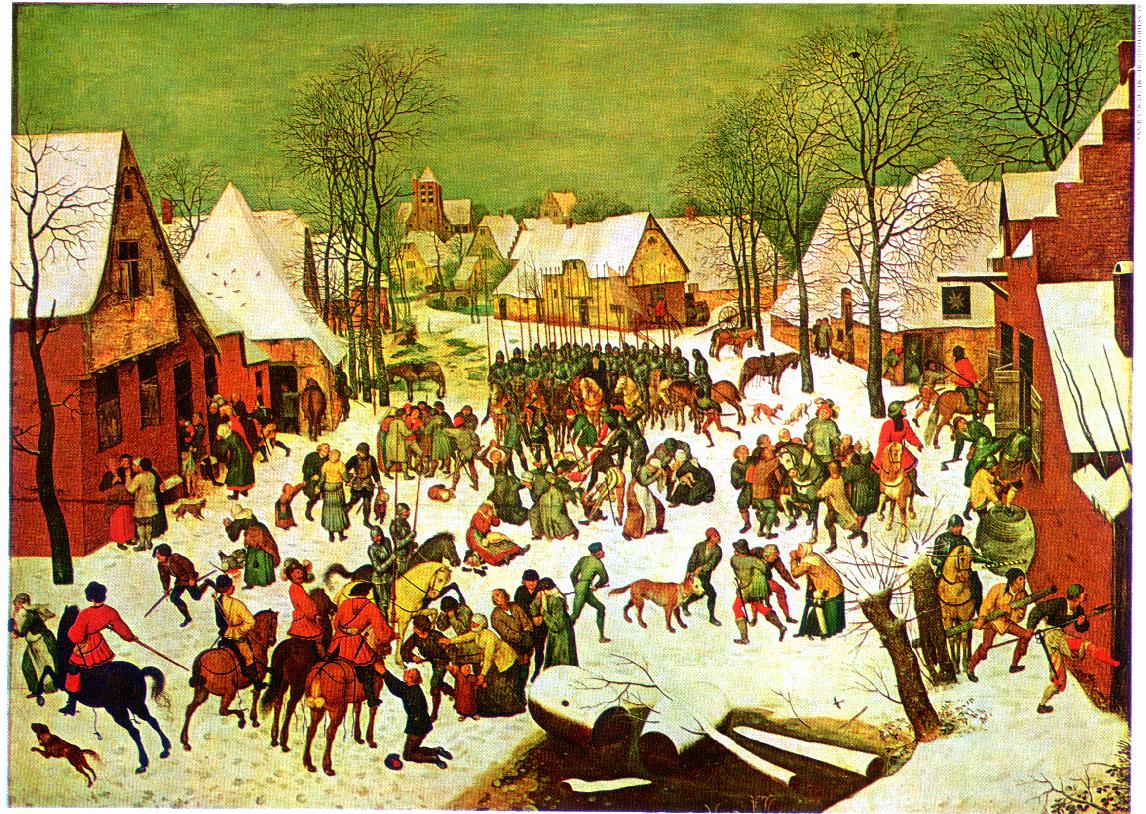
Towards the hour of
supper on Friday, the twenty-sixth day of the month of December, a
little shepherd lad came into Nazareth, crying bitterly.
Some peasants, who
were drinking ale in the Blue Lion, opened the shutters to look into the
village orchard, and saw the child running over the snow. They
recognized him as the son of Korneliz, and called from the window: "What
is the matter? It's time you were abed!"
But, sobbing still
and shaking with terror, the boy cried that the Spaniards had come, that
they had set fire to the farm, had hanged his mother among the nut
trees and bound his nine little sisters to the trunk of a big tree. At
this the peasants rushed out of the inn. Surrounding the child, they
stunned him with their questionings and outcries. Between his sobs, he
added that the soldiers were on horseback and wore armor, that they had
taken away the cattle of his uncle, Petrus Krayer, and would soon be in
the forest with the sheep and cows. All now ran to the Golden Swan
where, as they knew, Korneliz and his brother-in-law were also drinking
their mug of ale. The moment the innkeeper heard these terrifying
tidings, he hurried into the village, crying that the Spaniards were at
hand.
What a stir, what an
uproar there was then in Nazareth! Women opened windows, and peasants
hurriedly left their houses carrying lights which were put out when they
reached the orchard, where, because of the snow and the full moon, one
could see as well as at midday.
Later, they gathered
round Korneliz and Krayer, in the open space which faced the inns.
Several of them had brought pitchforks and rakes, and consulted
together, terror-stricken, under the trees.
But, as they did not
know what to do, one of them ran to fetch the cure, who owned
Korneliz's farm. He came out of the house with the sacristan carrying
the keys of the church. All followed him into the churchyard, whither
his cry came to them from the top of the tower, that he beheld nothing
either in the fields, or by the forest, but that around the farm he saw
ominous red clouds, for all that the sky was of a deep blue and agleam
with stars over the rest of the plain.
After taking counsel
for a long time in the churchyard, they decided to hide in the wood
through which the Spaniards must pass, and, if these were not too
numerous, to attack them and recover Petrus Krayer's cattle and the
plunder which had been taken from the farm.
Having armed
themselves with pitchforks and spades, while the women remained outside
the church with the cure, they sought a suitable ambuscade. Approaching a
mill on a rising ground adjacent to the verge of the forest, they saw
the light of the burning farm flaming against the stars. There they
waited under enormous oaks, before a frozen mere.
A shepherd, known as
Red Dwarf, climbed the hill to warn the miller, who had stopped his
mill when he saw the flames on the horizon. He bade the peasant enter,
and both men went to a window to stare out into the night.
Before them the moon
shone over the burning farmstead, and in its light they saw a long
procession winding athwart the snow. Having carefully scrutinized it,
the Dwarf descended where his comrades waited under the trees, and now,
they too gradually distinguished four men on horseback behind a flock
which moved grazing on the plain.
While the peasants
in their blue breeches and red cloaks continued to search about the
margins of the mere and under the snowlit trees, the sacristan pointed
out to them a box-hedge, behind which they hid.
The Spaniards,
driving before them the sheep and the cattle, advanced upon the ice.
When the sheep reached the hedge they began to nibble at the green
stuff, and now Korneliz broke from the shadows of the bushes, followed
by the others with their pitchforks. Then in the midst of the huddled-up
sheep and of the cows who stared affrighted, the savage strife was
fought out beneath the moon, and ended in a massacre.
When they had slain
not only the Spaniards, but also their horses, Korneliz rushed thence
across the meadow in the direction of the flames, while the others
plundered and stripped the dead. Thereafter all returned to the village
with their flocks. The women, who were observing the dark forest from
behind the churchyard walls, saw them coming through the trees and ran
with the cure to meet them, and all returned dancing joyously amid the
laughter of the children and the barking of the dogs.
But, while they made
merry, under the pear trees of the orchard, where the Red Dwarf had
hung lanterns in honor of the kermesse, they anxiously demanded of the
cure what was to be done.
The outcome of this
was the harnessing of a horse to a cart in order to fetch the bodies of
the woman and the nine little girls to the village. The sisters and
other relations of the dead woman got into the cart along with the cure,
who, being old and very fat, could not walk so far.
In silence they
entered the forest, and emerged upon the moonlit plain. There, in the
white light, they descried the dead men, rigid and naked, among the
slain horses. Then they moved onward toward the farm, which still burned
in the midst of the plain.
When they came to
the orchard of the flaming house, they stopped at the gate of the
garden, dumb before the overwhelming misfortune of the peasant. For
there, his wife hung, quite naked, on the branches of an enormous nut
tree, among which he himself was now mounting on a ladder, and beneath
which, on the frozen grass, lay his nine little daughters. Korneliz had
already, climbed along the vast boughs, when suddenly, by the light of
the snow, he saw the crowd who horror-struck watched his every movement.
With tears in his eyes, he made a sign to them to help him, whereat the
innkeepers of the Blue Lion and the Golden Sun, the cure, with a
lantern, and many others, climbed up in the moonshine amid the
snow-laden branches, to unfasten the dead. The women of the village
received the corpse in their arms at the foot of the tree; even as our
Lord Jesus Christ was received by the women at the foot of the Cross.
On the morrow they buried her, and for the week thereafter nothing unusual happened in Nazareth.
But the following
Sunday, hungry wolves ran through the village after high mass, and it
snowed until midday. Then, suddenly, the sun shone brilliantly, and the
peasants went to dine as was their wont, and dressed for the
benediction.
There was no one to
be seen on the Place, for it froze bitterly. Only the dogs and chickens
roamed about under the trees, or the sheep nibbled at a three-cornered
bit of grass, while the cure's servant swept away the snow from his
garden.
At that moment a
troop of armed men crossed the stone bridge at the end of the village,
and halted in the orchard. Peasants hurried from their houses, but,
recognizing the new-comers as Spaniards, they retreated terrified, and
went to the windows to see what would happen.
About thirty
soldiers, in full armor, surrounded an old man with a white beard.
Behind them, on pillions, rode red and yellow lancers who jumped down
and ran over the snow to shake off their stiffness, while several of the
soldiers in armor dismounted likewise and fastened their horses to the
trees.
Then they moved in
the direction of the Golden Sun, and knocked at the door. It was opened
reluctantly; the soldiers went in, warmed themselves near the fire, and
called for ale.
Presently they came
out of the inn, carrying pots, jugs, and rye-bread for their companions,
who surrounded the man with the white beard, where he waited behind the
hedge of lances.
As the street
remained deserted the commander sent some horsemen to the back of the
houses, to guard the village on the country side. He then ordered the
lancers to bring him all the children of two years old and under, to be
massacred, as is written in the Gospel of St. Matthew.
The soldiers first
went to the little inn of the Green Cabbage, and to the barber's cottage
which stood side by side midway in the street.
One of them opened a
sty and a litter of pigs wandered into the village. The innkeeper and
the barber came out, and humbly asked the men what they wanted; but they
did not understand Flemish, and went into the houses to look for the
children.
The innkeeper had
one child, who, in its little shift, was screaming on the table where
they had just dined. A soldier took it in his arms, and carried it away
under the apple trees, while the father and mother followed, crying.
Thereafter the
lancers opened other stable doors,—those of the cooper, the blacksmith,
the cobbler, and calves, cows, asses, pigs, goats, and sheep roamed
about the square. When they broke the carpenter's windows, several of
the oldest and richest inhabitants of the village assembled in the
street, and went to meet the Spaniards. Respectfully they took off their
caps and hats to the leader in the velvet mantle, and asked him what he
was going to do. He did not, understand their language; so some one ran
to fetch the cure.
The priest was
putting on a gold chasuble in the vestry, in readiness for the
benediction. The peasant cried: "The Spaniards are in the orchard!"
Horrified, the cure ran to the door of the church, and the choir-boys
followed, carrying wax-tapers and censer.
As he stood there,
he saw the animals from the pens and stables wandering on the snow and
on the grass; the horsemen in the village, the soldiers before the
doors, horses tied to trees all along the street; men and women
entreating the man who held the child in its little shift.
The cure hastened
into the churchyard, and the peasants turned anxiously towards him as he
came through the pear trees, like the Divine Presence itself robed in
white and gold. They crowded about him where he confronted the man with
the white beard.
He spoke in Flemish and in Latin, but the commander merely shrugged his shoulders to show that he did not understand.
The villagers asked
their priest in a low voice: "What does he say? What is he going to do?"
Others, when they saw the cure in the orchard, came cautiously from
their cottages, women hurried up and whispered in groups, while the
soldiers, till that moment besieging an inn, ran back at sight of the
crowd in the square.
Then the man who held the innkeeper's child by the leg cut off its head with his sword.
The people saw the
head fall, and thereafter the body lie bleeding upon the grass. The
mother picked it up, and carried it away, but forgot the head. She ran
towards her home, but stumbling against a tree fell prone on the snow,
where she lay in a swoon, while the father struggled between two
soldiers.
Some young peasants
cast stones and blocks of wood at the Spaniards, but the horsemen all
lowered their lances; the women fled and the cure with his parishioners
began to shriek with horror, amid the bleating of the sheep, the
cackling of the geese, and the barking of the dogs.
But as the soldiers moved away again into the street, the crowd stood silent to see what would happen.
A troop entered the
shop kept by the sacristan's sisters, but came out quietly, without
harming the seven women, who knelt on the threshold praying.
From these they went
to the inn of St. Nicholas, which belonged to the Hunchback. Here, too,
so as to appease them, the door was opened at once; but, when the
soldiers reappeared amid a great uproar, they carried three children in
their arms. The marauders were surrounded by the Hunchback, his wife,
and daughters, all, with clasped hands, imploring for mercy.
When the soldiers
came to their white-bearded leader, they placed the children at the foot
of an elm, where the little ones remained seated on the snow in their
Sunday clothes. But one of them, in a yellow frock, got up and toddled
unsteadily towards the sheep. A soldier followed, with bare sword; and
the child died with his face in the grass, while the others were killed
around the tree.
The peasants and the
innkeeper's daughters all fled screaming, and shut themselves up in
their houses. The cure, who was left alone in the orchard, threw himself
on his knees, first before one horseman, then another, and with crossed
arms, supplicated the Spaniards piteously, while the fathers and
mothers seated on the snow beyond wept bitterly for the dead children
whom they held upon their knees.
As the lancers
passed along the street, they noticed a big blue farmstead. When they
had tried, in vain, to force open the oaken door studded with nails,
they clambered atop of some tubs, which were frozen over near the
threshold, and by this means gained the house through the upper windows.
There had been a
kermesse in this farm. At sound of the broken window-panes, the families
who had assembled there to eat gaufres, custards, and hams, crowded
together behind the table on which still stood some empty jugs and
dishes. The soldiers entered the kitchen, and after savage struggle in
which many were wounded, they seized all the little boys and girls;
then, with these, and the servant who had bitten a lancer's thumb, they
left the house and fastened the door behind them in such a way that the
parents could not get out.
Thereafter the
lancers opened other stable doors,—those of the cooper, the blacksmith,
the cobbler, and calves, cows, asses, pigs, goats, and sheep roamed
about the square. When they broke the carpenter's windows, several of
the oldest and richest inhabitants of the village assembled in the
street, and went to meet the Spaniards. Respectfully they took off their
caps and hats to the leader in the velvet mantle, and asked him what he
was going to do. He did not, understand their language; so some one ran
to fetch the cure.
The priest was
putting on a gold chasuble in the vestry, in readiness for the
benediction. The peasant cried: "The Spaniards are in the orchard!"
Horrified, the cure ran to the door of the church, and the choir-boys
followed, carrying wax-tapers and censer.
As he stood there,
he saw the animals from the pens and stables wandering on the snow and
on the grass; the horsemen in the village, the soldiers before the
doors, horses tied to trees all along the street; men and women
entreating the man who held the child in its little shift.
The cure hastened
into the churchyard, and the peasants turned anxiously towards him as he
came through the pear trees, like the Divine Presence itself robed in
white and gold. They crowded about him where he confronted the man with
the white beard.
He spoke in Flemish and in Latin, but the commander merely shrugged his shoulders to show that he did not understand.
The villagers asked
their priest in a low voice: "What does he say? What is he going to do?"
Others, when they saw the cure in the orchard, came cautiously from
their cottages, women hurried up and whispered in groups, while the
soldiers, till that moment besieging an inn, ran back at sight of the
crowd in the square.
Then the man who held the innkeeper's child by the leg cut off its head with his sword.
The people saw the
head fall, and thereafter the body lie bleeding upon the grass. The
mother picked it up, and carried it away, but forgot the head. She ran
towards her home, but stumbling against a tree fell prone on the snow,
where she lay in a swoon, while the father struggled between two
soldiers.
Some young peasants
cast stones and blocks of wood at the Spaniards, but the horsemen all
lowered their lances; the women fled and the cure with his parishioners
began to shriek with horror, amid the bleating of the sheep, the
cackling of the geese, and the barking of the dogs.
But as the soldiers moved away again into the street, the crowd stood silent to see what would happen.
A troop entered the
shop kept by the sacristan's sisters, but came out quietly, without
harming the seven women, who knelt on the threshold praying.
From these they went
to the inn of St. Nicholas, which belonged to the Hunchback. Here, too,
so as to appease them, the door was opened at once; but, when the
soldiers reappeared amid a great uproar, they carried three children in
their arms. The marauders were surrounded by the Hunchback, his wife,
and daughters, all, with clasped hands, imploring for mercy.
When the soldiers
came to their white-bearded leader, they placed the children at the foot
of an elm, where the little ones remained seated on the snow in their
Sunday clothes. But one of them, in a yellow frock, got up and toddled
unsteadily towards the sheep. A soldier followed, with bare sword; and
the child died with his face in the grass, while the others were killed
around the tree.
The peasants and the
innkeeper's daughters all fled screaming, and shut themselves up in
their houses. The cure, who was left alone in the orchard, threw himself
on his knees, first before one horseman, then another, and with crossed
arms, supplicated the Spaniards piteously, while the fathers and
mothers seated on the snow beyond wept bitterly for the dead children
whom they held upon their knees.
As the lancers
passed along the street, they noticed a big blue farmstead. When they
had tried, in vain, to force open the oaken door studded with nails,
they clambered atop of some tubs, which were frozen over near the
threshold, and by this means gained the house through the upper windows.
There had been a
kermesse in this farm. At sound of the broken window-panes, the families
who had assembled there to eat gaufres, custards, and hams, crowded
together behind the table on which still stood some empty jugs and
dishes. The soldiers entered the kitchen, and after savage struggle in
which many were wounded, they seized all the little boys and girls;
then, with these, and the servant who had bitten a lancer's thumb, they
left the house and fastened the door behind them in such a way that the
parents could not get out.
The villagers who
had no children slowly left their houses, and followed the soldiers at a
distance. They saw them throw down their victims on the grass before
the old man, and callously kill them with lance and sword. During this,
men and women leaned out of all the windows of the blue house, and out
of the barn, blaspheming and flinging their hands to heaven, when they
saw the red, pink, and white frocks of their motionless little ones on
the grass between the trees. The soldiers next hanged the farm servant
at the sign of the Half Moon on the other side of the street, and there
was a long silence in the village.
The massacre now
became general. Mothers fled from their houses, and attempted to escape
through the flower and vegetable gardens, and so into the country
beyond, but the horsemen pursued them and drove them back into the
street. Peasants with caps in their clasped hands knelt before the men
who dragged away their children, while amid the confusion the dogs
barked joyously. The cure, with hands upraised to heaven, rushed up and
down in front of the houses and under the trees, praying desperately;
here and there, soldiers, trembling with cold, blew on their fingers as
they moved about the road, or waited with hands in their breeches
pockets, and swords under their arms, before the windows of the houses
which were being scaled.
Everywhere, as in
small bands of twos and threes, they moved along the streets, where
these scenes were being enacted, and entered the houses, they beheld the
piteous grief of the peasants. The wife of a market-gardener, who
occupied a red brick cottage near the church, pursued with a wooden
stool the two men who carried off her children in a wheelbarrow. When
she saw them die, a horrible sickness came upon her, and they thrust her
down on the stool under a tree by the roadside.
Other soldiers
swarmed up the lime trees in front of a farmstead with its blank walls
tinted mauve, and entered the house by removing the tiles. When they
came back on to the roof, the father and mother, with outstretched arms,
tried to follow them through the opening, but the soldiers repeatedly
pushed them back, and had at last to strike them on the head with their
swords, before they could disengage themselves and regain the street.
One family shut up
in the cellar of a large cottage lamented near the grating, through
which the father wildly brandished a pitchfork. Outside on a heap of
manure, a bald old man sobbed all alone; in the square, a woman in a
yellow dress had swooned, and her weeping husband now supported her
under the arms, against a pear tree; another woman in red fondled her
little girl, bereft of her hands, and lifted now one tiny arm, now the
other, to see if the child would not move. Yet another woman fled
towards the country; but the soldiers pursued her among the hayricks,
which stood out in black relief against the fields of snow.
Beneath the inn of
the Four Sons of Aymon a surging tumult reigned. The inhabitants had
formed a barricade, and the soldiers went round and round the house
without being able to enter. Then they were attempting to climb up to
the signboard by the creepers, when they noticed a ladder behind the
garden door. This they raised against the wall, and went up it in file.
But the innkeeper and all his family hurled tables, stools, plates, and
cradles down upon them from the windows; the ladder was overturned, and
the soldiers fell.
In a wooden hut at
the end of the village, another band found a peasant woman washing her
children in a tub near the fire. Being old and very deaf, she did not
hear them enter. Two men took the tub and carried it away, and the
stupefied woman followed with the clothes in which she was about to
dress the children. But when she saw traces of blood everywhere in the
village, swords in the orchards, cradles overturned in the street, women
on their knees, others who wrung their hands over the dead, she began
to scream and beat the soldiers, who put down the tub to defend
themselves. The cure hastened up also, and with hands clasped over his
chasuble, entreated the Spaniards before the naked little ones howling
in the water. Some soldiers came up, tied the mad peasant to a tree, and
carried off the children.
The butcher, who had
hidden his little girl, leaned against his shop, and looked on
callously. A lancer and one of the men in armor entered the house and
found the child in a copper boiler. Then the butcher in despair took one
of his knives and rushed after them into the street, but soldiers who
were passing disarmed him and hanged him by the hands to the hooks in
the wall—there, among the flayed animals, he kicked and struggled,
blaspheming, until the evening.
Near the churchyard,
there was a great gathering before a long, low house, painted green.
The owner, standing on his threshold, shed bitter tears; as he was very
fat and jovial looking, he excited the pity of some soldiers who were
seated in the sun against the wall, patting a dog. The one, too, who
dragged away his child by the hand, gesticulated as if to say: "What can
I do? It's not my fault!"
A peasant who was
pursued, jumped into a boat, moored near the stone bridge, and with his
wife and children moved away across the unfrozen part of the narrow
lagoon. Not daring to follow, the soldiers strode furiously through the
reeds. They climbed up into the willows on the banks to try to reach the
fugitives with their lances—as they did not succeed, they continued for
a long time to threaten the terrified family adrift upon the black
water.
The orchard was
still full of people, for it was there, in front of the white-bearded
man who directed the massacre, that most of the children were killed.
Little dots who could just walk alone stood side by side munching their
slices of bread and jam, and stared curiously at the slaying of their
helpless playmates, or collected round the village fool who played his
flute on the grass.
Then suddenly there
was a uniform movement in the village. The peasants ran towards the
castle which stood on the brown rising ground, at the end of the street.
They had seen their seigneur leaning on the battlements of his tower
and watching the massacre. Men, women, old people, with hands
outstretched, supplicated to him, in his velvet mantle and his gold cap,
as to a king in heaven. But he raised his arms and shrugged his
shoulders to show his helplessness, and when they implored him more and
more persistently, kneeling in the snow, with bared heads, and uttering
piteous cries, he turned slowly into the tower and the peasants' last
hope was gone.
When all the
children were slain, the tired soldiers wiped their swords on the grass,
and supped under the pear trees. Then they mounted one behind the
other, and rode out of Nazareth across the stone bridge, by which they
had come.
The setting of the
sun behind the forest made the woods aflame, and dyed the village
blood-red. Exhausted with running and entreating, the cure had thrown
himself upon the snow, in front of the church, and his servant stood
near him. They stared upon the street and the orchard, both thronged
with the peasants in their best clothes. Before many thresholds, parents
with dead children on their knees bewailed with ever fresh amaze their
bitter grief. Others still lamented over the children where they had
died, near a barrel, under a barrow, or at the edge of a pool. Others
carried away the dead in silence. There were some who began to wash the
benches, the stools, the tables, the blood-stained shifts, and to pick
up the cradles which had been thrown into the street. Mother by mother
moaned under the trees over the dead bodies which lay upon the grass,
little mutilated bodies which they recognized by their woollen frocks.
Those who were childless moved aimlessly through the square, stopping at
times in front of the bereaved, who wailed and sobbed in their sorrow.
The men, who no longer wept, sullenly pursued their strayed animals,
around which the barking dogs coursed; or, in silence, repaired so far
their broken windows and rifled roofs. As the moon solemnly rose through
the quietudes of the sky, deep silence as of sleep descended upon the
village, where now not the shadow of a living thing stirred.
